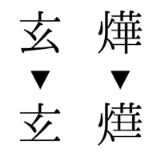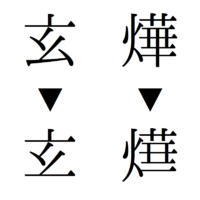
Naming taboo
Encyclopedia
Naming taboo is a cultural taboo
against speaking or writing the given names of exalted persons in China
and neighboring nations in the ancient Chinese cultural sphere
.
 There were three ways to avoid using a taboo character:
There were three ways to avoid using a taboo character:
Compare to the writing of G-d or L-rd in Judaism.
, whose given name Bingyi (病已) contained two very common characters, changed his name to Xun (詢), a far less common character, with the stated purpose of making it easier for his people to avoid using his name. Similarly, Emperor Taizong of Tang
, whose given name Shimin (世民) also contained two very common characters, ordered that name avoidance only required the avoidance of the characters Shi and Min in direct succession and that it did not require the avoidance of those characters in isolation. However, his son Emperor Gaozong of Tang
effectively made this edict of Emperor Taizong ineffective after his death by requiring the complete avoidance of the characters Shi and Min, necessitating the chancellor Li Shiji
to change his name to Li Ji.
The custom of naming taboo had a built-in contradiction: without knowing what the emperors' names were one could hardly be expected to avoid them, so somehow the emperors' names had to be informally transmitted to the populace to allow them to learn them in order to avoid them. In one famous incident in 435, during the Northern Wei Dynasty, Goguryeo
ambassadors made a formal request that the imperial government issue them a document containing the emperors' names so that they could avoid offending the emperor while submitting their king's petition. Emperor Taiwu of Northern Wei
agreed and issued them such a document. However, the mechanism of how the regular populace would be able to learn the emperors' names remained generally unclear throughout Chinese history.
Since every reign of every dynasty had its own naming taboos, the study of naming taboos can help date an ancient text.
In Vietnam, the family name Hoàng (黄) was changed to Huỳnh in the South due to the naming taboo of Lord Nguyễn Hoàng's name. Similarly, the family name "Vũ" is known as "Võ" in the South.
Taboo
A taboo is a strong social prohibition relating to any area of human activity or social custom that is sacred and or forbidden based on moral judgment, religious beliefs and or scientific consensus. Breaking the taboo is usually considered objectionable or abhorrent by society...
against speaking or writing the given names of exalted persons in China
China
Chinese civilization may refer to:* China for more general discussion of the country.* Chinese culture* Greater China, the transnational community of ethnic Chinese.* History of China* Sinosphere, the area historically affected by Chinese culture...
and neighboring nations in the ancient Chinese cultural sphere
Sinosphere
In areal linguistics, Sinosphere refers to a grouping of countries and regions that are currently inhabited with a majority of Chinese population or were historically under Chinese cultural influence...
.
Kinds of naming taboo
- The naming taboo of the state (国讳; 國諱) discouraged the use of the emperor's given name and those of his ancestors. For example, during the Qin DynastyQin DynastyThe Qin Dynasty was the first imperial dynasty of China, lasting from 221 to 207 BC. The Qin state derived its name from its heartland of Qin, in modern-day Shaanxi. The strength of the Qin state was greatly increased by the legalist reforms of Shang Yang in the 4th century BC, during the Warring...
, Qin Shi HuangQin Shi HuangQin Shi Huang , personal name Ying Zheng , was king of the Chinese State of Qin from 246 BC to 221 BC during the Warring States Period. He became the first emperor of a unified China in 221 BC...
's given name Zheng (政) was avoided, and the first month of the year "Zheng Yue" (政月: the administrative month) was rewritten into "Zheng Yue" (正月: the upright month) and furthermore renamed as "Duan Yue" (端月: the proper/upright month). The character 正 was also pronounced with a different toneTone (linguistics)Tone is the use of pitch in language to distinguish lexical or grammatical meaning—that is, to distinguish or inflect words. All verbal languages use pitch to express emotional and other paralinguistic information, and to convey emphasis, contrast, and other such features in what is called...
(zhèng to zhēng) to avoid any similarity. Generally, ancestor names going back to seven generations were avoided. The strength of this taboo was reinforced by law; transgressors could expect serious punishment for writing an emperor's name without modifications. In 1777, Wang XihouWang XihouWang Xihou was a Chinese scholar from Xinchang County during the Qing dynasty who was executed under the rule of Emperor Qianlong....
(王錫侯) in his dictionary criticized the Kangxi dictionaryKangxi dictionaryThe Kangxi Dictionary was the standard Chinese dictionary during the 18th and 19th centuries. The Kangxi Emperor of the Manchu Qing Dynasty ordered its compilation in 1710. The creator innovated greatly by reusing and confirming the new Zihui system of 596 radicals, since then known as 596 Kangxi...
and wrote the Qianlong EmperorQianlong EmperorThe Qianlong Emperor was the sixth emperor of the Manchu-led Qing Dynasty, and the fourth Qing emperor to rule over China proper. The fourth son of the Yongzheng Emperor, he reigned officially from 11 October 1735 to 8 February 1796...
's name without leaving out any stroke as required. These disrespects resulted in his and his family's executionsNine exterminationsThe nine familial exterminations or nine kinship exterminations , literally "family execution" and miè zú , literally "family extermination" or "execution of nine relations") was the most serious punishment for a capital offense in Ancient China...
and confiscation of their property.
- The naming taboo of the clan (家讳; 家諱) discouraged the use of the names of one's own ancestors. In diplomatic documents and letters between clans, each clan's naming taboos were observed.
- The naming taboo of the holinesses (圣人讳; 聖人諱) discouraged the use of the names of respected people. For example, writing ConfuciusConfuciusConfucius , literally "Master Kong", was a Chinese thinker and social philosopher of the Spring and Autumn Period....
' name was taboo during the Jin Dynasty.
Methods to avoid offence

- Changing the character to another one which usually was a synonymSynonymSynonyms are different words with almost identical or similar meanings. Words that are synonyms are said to be synonymous, and the state of being a synonym is called synonymy. The word comes from Ancient Greek syn and onoma . The words car and automobile are synonyms...
or sounded like the character being avoided. For example, the Xuanwu Gate (玄武門:the Black Warrior Gate) of the Forbidden CityForbidden CityThe Forbidden City was the Chinese imperial palace from the Ming Dynasty to the end of the Qing Dynasty. It is located in the middle of Beijing, China, and now houses the Palace Museum...
was renamed as "Shenwu" (神武門:Gate of Divine MightGate of Divine MightThe Gate of Divine Might or Gate of Divine Prowess is the northern gate of the Forbidden City in Beijing, China. It faces Jingshan Park. A tablet above the doorway reads "The Palace Museum" in Chinese....
) in order to avoid the Kangxi EmperorKangxi EmperorThe Kangxi Emperor ; Manchu: elhe taifin hūwangdi ; Mongolian: Энх-Амгалан хаан, 4 May 1654 –20 December 1722) was the fourth emperor of the Qing Dynasty, the first to be born on Chinese soil south of the Pass and the second Qing emperor to rule over China proper, from 1661 to 1722.Kangxi's...
's name Xuanye (玄燁). - Leaving the character as a blank.
- Omitting a stroke in the character, especially the final stroke.
Compare to the writing of G-d or L-rd in Judaism.
Naming taboo in history
Throughout Chinese history, there were emperors whose names contained common characters who would try to alleviate the burden of the populace in practicing name avoidance. For example, Emperor Xuan of HanEmperor Xuan of Han
Emperor Xuan of Han was an emperor of the Chinese Han Dynasty from 74 BC to 49 BC. His life story was a riches-to-rags-to-riches story.Emperor Xuan was the great grandson of Emperor Wu...
, whose given name Bingyi (病已) contained two very common characters, changed his name to Xun (詢), a far less common character, with the stated purpose of making it easier for his people to avoid using his name. Similarly, Emperor Taizong of Tang
Emperor Taizong of Tang
Emperor Taizong of Tang , personal name Lǐ Shìmín , was the second emperor of the Tang Dynasty of China, ruling from 626 to 649...
, whose given name Shimin (世民) also contained two very common characters, ordered that name avoidance only required the avoidance of the characters Shi and Min in direct succession and that it did not require the avoidance of those characters in isolation. However, his son Emperor Gaozong of Tang
Emperor Gaozong of Tang
Emperor Gaozong of Tang , personal name Li Zhi , was the third emperor of the Tang Dynasty in China, ruling from 649 to 683...
effectively made this edict of Emperor Taizong ineffective after his death by requiring the complete avoidance of the characters Shi and Min, necessitating the chancellor Li Shiji
Li Shiji
Li Shiji , né Xu Shiji , later known in the reign of Emperor Gaozong of Tang as Li Ji , courtesy name Maogong , formally Duke Zhenwu of Ying , was one of the most celebrated generals early in the Chinese Tang Dynasty...
to change his name to Li Ji.
The custom of naming taboo had a built-in contradiction: without knowing what the emperors' names were one could hardly be expected to avoid them, so somehow the emperors' names had to be informally transmitted to the populace to allow them to learn them in order to avoid them. In one famous incident in 435, during the Northern Wei Dynasty, Goguryeo
Goguryeo
Goguryeo or Koguryŏ was an ancient Korean kingdom located in present day northern and central parts of the Korean Peninsula, southern Manchuria, and southern Russian Maritime province....
ambassadors made a formal request that the imperial government issue them a document containing the emperors' names so that they could avoid offending the emperor while submitting their king's petition. Emperor Taiwu of Northern Wei
Emperor Taiwu of Northern Wei
Emperor Taiwu of Northern Wei , personal name Tuoba Tao , nickname Foli , was an emperor of the Chinese/Xianbei dynasty Northern Wei...
agreed and issued them such a document. However, the mechanism of how the regular populace would be able to learn the emperors' names remained generally unclear throughout Chinese history.
Since every reign of every dynasty had its own naming taboos, the study of naming taboos can help date an ancient text.
In Vietnam, the family name Hoàng (黄) was changed to Huỳnh in the South due to the naming taboo of Lord Nguyễn Hoàng's name. Similarly, the family name "Vũ" is known as "Võ" in the South.
Further Reading
- 陳垣 (Chen Yuan),《史諱舉例》 (Examples of Taboos in History) - the pioneering work in the field, written during the early 20th century, numerous editions

